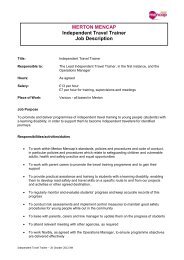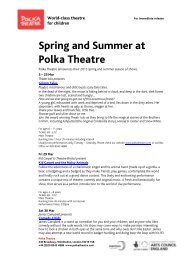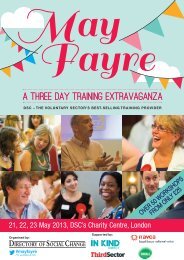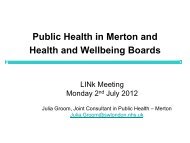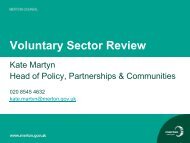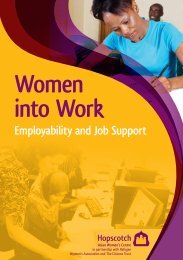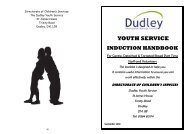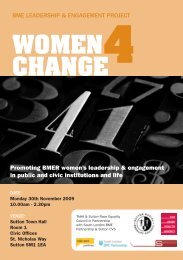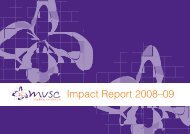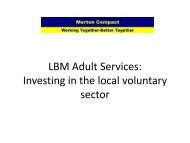MERTON COMPACT - Merton Council
MERTON COMPACT - Merton Council
MERTON COMPACT - Merton Council
- No tags were found...
You also want an ePaper? Increase the reach of your titles
YUMPU automatically turns print PDFs into web optimized ePapers that Google loves.
<strong>MERTON</strong> <strong>COMPACT</strong>Working Together - Better Together
<strong>MERTON</strong> <strong>COMPACT</strong>Working Together - Better TogetherForewordOur vision is for <strong>Merton</strong> to be a great place to live, work and learn.The needs and hopes of people can be met if sectors are willing to buildstrong, healthy and vibrant partnerships to improve services.From National Compact week in November 2003, representatives from<strong>Merton</strong>’s voluntary and community sector, local authority and primary caretrust have all contributed to the development of a local Compact for<strong>Merton</strong>.All partners are encouraged to support the Compact’s principles andpractices and to be involved in the development of them and the associatedCodes of Practice.We are delighted to present the <strong>Merton</strong> Compact as a first step in buildingon relations and developing a Compact way of working for <strong>Merton</strong>*.<strong>Council</strong>lor Andrew Judge, Leader of <strong>Merton</strong> <strong>Council</strong>Kay Sonneborn, Chair of Sutton and <strong>Merton</strong> Primary Care TrustLola Barrett, Chair of <strong>Merton</strong> Voluntary Service <strong>Council</strong>28th October 2004*To be involved in the ongoing development of the <strong>Merton</strong> Compact please contact one ofthe representatives listed in the back.
What is a Compact?Compacts are partnership agreements between public bodies and thevoluntary and community sector to improve their relationships and providea framework within which the sectors can understand what to expect fromeach other. Compacts offer the means of supporting the development of thevoluntary and community sector’s capacity so that groups can do more tomeet both their aims and those of their public sector partners, therebyenhancing their contribution to the local community. The national compact(between central government and the voluntary and community sector) waslaunched in 1998 and it is now a requirement for all local authorities andprimary care trusts to develop a compact with the voluntary and communitysector. The Compact is an approved and signed policy and affects theconduct of all partners.What is the <strong>Merton</strong> Compact?The <strong>Merton</strong> Compact is a partnership agreement between the LondonBorough of <strong>Merton</strong> 1 and the Sutton and <strong>Merton</strong> Primary Care Trust2 (publicsector) and the voluntary and community sector3 and is approved andsigned policy. The <strong>Merton</strong> Compact subscribes to the principles of thenational compact and its associated codes of practice. Accordingly, it isintended to expand the scope of the <strong>Merton</strong> Compact by seeking to sign upother public bodies, especially those partner bodies in membership of the<strong>Merton</strong> Partnership (the Local Strategic Partnership in <strong>Merton</strong>). It will alsobe embedded in the Community Plan.This Compact sets out the principles and values of the partnership and aimsto achieve a Compact way of working by helping us:• Communicate better with each other• Understand and respect each other’s views• Work together more effectively to support the people of <strong>Merton</strong>1 The London Borough of <strong>Merton</strong> is the Local Authority in <strong>Merton</strong>2 Sutton and <strong>Merton</strong> Primary Care Trust (PCT) is a public body charged with providing and managing health services forresidents. It has four major responsibilities: to improve the health of local people; to bring into one team GPs, communitynursing and therapy services; to provide a full range of local GP and community health services; and to commission hospitaland mental services.3 The Voluntary and Community Sector is comprised of self-governing organsiations that exist to serve a public benefit andgenerate social capital. It is independent of the formal structures of government or the profit sector and relies heavily onvolunteers in carrying out its mandate. There are several hundred voluntary and community organisations in <strong>Merton</strong>.
What are our Compact Principles?Our shared aim is to provide quality services to the people of <strong>Merton</strong>. Werecognise that there is added value in working in partnership towardscommon aims and objectives. The following principles will underpin thispartnership and these aims:• Community involvement and voluntary action are essential to the qualityof life in <strong>Merton</strong>. It is recognised that the voluntary and community sectormakes a valuable contribution to the economic, environmental and socialdevelopment of <strong>Merton</strong>.• The differences and diversity between the public sector and the voluntaryand community sector should be respected and valued• In the development and delivery of services, the public sector and thevoluntary and community sector have distinct but complementary roles• Each sector has its own set of responsibilities and constraints• The independence of the voluntary and community sector should berespected• To maximise the effectiveness of the voluntary and community sector,investment in its infrastructure is essential• The relationship between the sectors should be open and respectful anddemonstrate trust• Each sector should strive for excellence and equality of access• When working together contributions from each sector should be givenequal consideration and respect• Organisations in each sector have the right to contribute to and, ifnecessary, challenge matters that affect them
Together we will:■✓ Develop mutual understanding of the real needs in <strong>Merton</strong> and bringforward essential funding and a realistic level of resources to addressthese needs■✓ Raise awareness of <strong>Merton</strong>’s needs at regional, national and Europeanlevels■✓ Value both informal and organised volunteer activity in <strong>Merton</strong>, as well asrespecting all organisations for what they do■✓ Develop policies and services taking into account the experience andviews of each sector■✓ Develop effective methods of communication■✓ Promote Compact principles in our working relationships and encouragethe adoption of the Compact by others■✓ Update the Compact by reviewing it regularly■✓ Develop Compact Codes of Practice and related action plans■✓ Resolve problems in a constructive and open way
Proposed Codes of PracticeWhen developed, the Codes of Practice will help bring the Compact principlesinto our day to day work and will provide the framework for the codes.Organisations from both sectors will be invited to adopt the Codes ofPractice and are encouraged to be involved in the ongoing development.1. Consultation and Policy Appraisal Code Principles1.1 Integral to project development and policy reviewConsultation should be considered at the start of a project or policy reviewto ensure that it happens at the appropriate stage in the project cycle. Themethods chosen, and success of these processes, should be continuouslyreviewed and evaluated throughout the life of the project.1.2 Carried out using agreed standardsConsultation between partners should be carried out to agreed standards.These should include defined timescales (ideally twelve weeks), summarisedreports, and clear feedback about results and decisions undertaken.1.3 Appropriate for the target groupsConsultation should be designed to be appropriate for the partners beingconsulted, both in terms of the methods used and the style of presentation.Consultation documents should be written in plain language with technicalterms explained. All methodologies should be fit for the purpose and targetgroup being consulted. Where appropriate, reports should be translated intoformats accessible to their audience, including those with languagedifficulties or physical and sensory disabilities.1.4 Genuine and transparentAny consultation exercise or document should specify which aspects arebeing presented for comment and which cannot be changed, to allowpartners to respond appropriately. It is understood that partners cannothave an impact on decision making for all aspects of each other’s work.Where this is not possible, partners should always make clear that adocument or event is for information purposes only rather than consultation.
1.5 Publicised and accessiblePartners should ensure that information and consultation exercises relevantto the work of other partners are well publicised. Consultations and relateddocuments should be easily accessible to groups with all levels of resourcesand in a format that will allow smaller organisations to respond.1.6 Shared where appropriatePartners should work together to share the resources available to undertakeconsultation where appropriate. The potential for joint consultationexercises should always be examined to reduce duplication.2. Funding, Procurement and Commissioning CodePrinciples2.1 Genuine and transparentThere will be openness and transparency to make it easier to find out aboutavailable funding. The partners will promote fair access to strategic, projectand contract funding.2.2 Corporate approachThe public sector will develop consistent procedures and a joint approach tosupporting the voluntary and community sector. They will operate acorporate approach to funding that is consistent and timely and streamlinesprocedures and reduces duplication, whilst exercising accountability ofpublic funds.2.3 Infrastructure and sustainabilityThe public sector recognises the importance of funding core costs and willinvest in the infrastructure of voluntary and community organisations. Italso recognises that longer term funding will improve sustainability andenable forward planning. The public sector will ensure proper considerationof the needs of small community groups by ensuring access to in-kindsupport, small grants, and investing in development support.
2.4 Needs led fundingFunding and support will be based on need and take account of thechanging demographic composition of <strong>Merton</strong>.2.5 ProportionalityThere will be a joint and consistent approach to monitoring and evaluationthat is effective and proportionate to the level of funding.2.6 Consequences of not fundingConsideration will be given to the effects on a voluntary or communityorganisation of any decision not to fund, or to withdraw funding, beforeany final decision is taken.2.7 Timely decisions and paymentsThe public sector will ensure sufficient notification of funding decisions andwill make timely payment of funds.3. Black and Minority Ethnic Organisations CodePrinciplesIt is recognised that the black and minority ethnic voluntary and communitysector, including faith groups and refugee and asylum seeker organisations,has a wealth of knowledge, expertise and experience and makes a valuableand important contribution to <strong>Merton</strong>.3.1 Funding and other supportA wide range of communities co-exist in the borough with differing needs.The public sector will ensure fair and equal access to funding and othersupport, recognising and appreciating that culturally appropriate serviceprovision can cost more and this should be reflected in funding agreements.3.2 Capacity buildingIt is recognised that appropriate support to build their capacity is one of thevehicles through which <strong>Merton</strong>’s black and minority ethnic organisationswill continue to be proactive and deliver professional services.
3.3 Consultation and participationIt is recognised that the involvement of black and minority ethniccommunity organisations is an intrinsic part of the consultation and policyprocess in <strong>Merton</strong>.4. Community Organisations Code PrinciplesEach community group is different in its purpose, its size and itsmembership. Small, unfunded groups comprise the majority of the localvoluntary and community sector and make a vital contribution to the localcommunity. Common to all is that they are close to the community andinvolve service users and carers. It is the community itself, often in smallinformal groups, taking action to get things done.4.1 Funding and other supportTo flourish it is recognised that community groups need access to fundingand other means of infrastructure support to increase their effectivenessand build social capital.4.2 Consultation and participationIt is important to involve community groups directly in the issues that affectthem.5. Volunteering Code PrinciplesVolunteering has been described as “an important expression of citizenshipand essential to democracy. It is the commitment of time and energy for thebenefit of society and the community and can take many forms. It isundertaken freely and by choice, without concern for financial gain.”5.1 Support of volunteersVolunteer-involving organisations need an effective and properly resourcedsupport framework.
5.2 Contribution of volunteersIt is recognised that volunteers make a major contribution to the economic,environmental and social development of <strong>Merton</strong>. This contribution shouldbe valued and the profile and ethos of volunteering promoted.5.3 Barriers to volunteeringThe barriers to people volunteering should be recognised by developing thecapacity of volunteer-involving organisations to respond to the changingneeds of volunteers.5.4 Investing in volunteeringBest practice for the management and support of volunteers will beencouraged.5.5 Consultation and participationThe contribution of volunteers in helping to develop public policy isrecognised and encouraged through involvement in consultation processesand campaigning.6. Governance Code Principles6.1 Adherence to legal obligations and best practice guidelinesThe voluntary and community sector will maintain high standards ofgovernance and conduct and comply with their reporting and accountabilityobligations.Other areas of the Governance Code Principles to be developed.
AcknowledgementsSincere thanks go to all those who participated in the development of the <strong>Merton</strong>Compact and the consultation process.Compact Working GroupFacilitator: <strong>Council</strong>lor Andrew Judge,London Borough of <strong>Merton</strong>Voluntary and Community SectorChris Frost, <strong>Merton</strong> Voluntary Service <strong>Council</strong>Lola Barrett, <strong>Merton</strong> Unity NetworkRay Hautot, St Mark’s Family CentreRoy Benjamin, Carers Support <strong>Merton</strong>Sarah Wilson, <strong>Merton</strong> Volunteer BureauTasneem Mohammadally, Ethnic MinorityCentreLondon Borough of <strong>Merton</strong>Cllrs. Ian Munn, Linda Kirby, Su Assinen, andMargaret BrierlyErnest Obumselu, Geoffrey Lutaaya, RobMoran, Robert Bowler and Tracey BedfordSutton and <strong>Merton</strong> Primary Care TrustElizabeth Kawonza, Jatinder Bhuhi andJemma GilbertConsultation and Policy Appraisal Sub-groupFacilitator: Jemma Gilbert,Sutton & <strong>Merton</strong> Primary Care TrustVoluntary and Community Sector:Chris Frost, <strong>Merton</strong> Voluntary Service <strong>Council</strong>Eula Valentine, <strong>Merton</strong> Sickle Cell andThalassaemia GroupJohn Gillies, <strong>Merton</strong> Citizens Advice BureauLola Barrett, <strong>Merton</strong> Unity NetworkRoy Benjamin, Carers Support <strong>Merton</strong>Sarah Wilson, <strong>Merton</strong> Volunteer BureauSelena Gardner, Commonside CommunityDevelopment TrustTasneem Mohammadally, Ethnic MinorityCentreLondon Borough of <strong>Merton</strong>Cllr. Su AssinenErnest Obumselu, Geoffrey Lutaaya, JoannaSwitalska, Rob Moran and Tracey BedfordSutton and <strong>Merton</strong> Primary Care TrustElizabeth Kawonza and Jatinder Bhuhi
Funding, Procurement and Commissioning Sub-groupFacilitator: Geoffrey Lutaaya,London Borough of <strong>Merton</strong>Voluntary and Community SectorBeverly Burton, <strong>Merton</strong> Voluntary Service <strong>Council</strong>Chris Frost, <strong>Merton</strong> Voluntary Service <strong>Council</strong>Frank Anti, <strong>Merton</strong> Racial Equality PartnershipFrank Mugyenyi, Centre for African DevelopmentHannah Neale, African Education, Culturaland Health OrganisationLola Barrett, <strong>Merton</strong> Unity Network,Patricia Anderson, <strong>Merton</strong> Unity NetworkRandolph Hurley, <strong>Merton</strong> Oasis Project,Vernon Jones, Wimbledon GuildLondon Borough of <strong>Merton</strong>Michael Frean and Tricia RossSutton and <strong>Merton</strong> Primary Care TrustJatinder BhuhiBlack and Minority Ethnic Organisations Sub-groupFacilitator: Geoffrey Lutaaya,London Borough of <strong>Merton</strong>Voluntary and Community SectorAbdul Towolawi, Ethnic Minority CentreEula Valentine, <strong>Merton</strong> Sickle Cell andThalassaemia GroupFrank Anti, <strong>Merton</strong> Racial Equality PartnershipLola Barrett, <strong>Merton</strong> Unity NetworkPatricia Anderson, <strong>Merton</strong> Unity NetworkRandolph Hurley, <strong>Merton</strong> Oasis ProjectLondon Borough of <strong>Merton</strong>Cllr. Horatio ChengDeirdre Costigan, Izzie MacGregor andMarsha Dann
Volunteering Sub-groupFacilitator: Andy Norrell,<strong>Merton</strong> Volunteer BureauVoluntary and Community SectorBarabra Cluer, Home-Start <strong>Merton</strong>Ian Petheridge, St Mark’s Family CentreMitsuyo Ogino, <strong>Merton</strong> Volunteer Bureau(Volunteer)Naheed Chaudry, <strong>Merton</strong> Sickle Cell andThalassaemia GroupRobert Devcic, <strong>Merton</strong> Volunteer Bureau(Volunteer)Patricia Anderson, <strong>Merton</strong> Unity NetworkPauline Codling, <strong>Merton</strong> Volunteer Bureau(Volunteer)London Borough of <strong>Merton</strong>Cllr. Su AssinenDeirdre Costigan and Geoffrey LutaayaSutton and <strong>Merton</strong> Primary Care TrustRussell StylesCompact Code of Good Practice on Community GroupsFacilitator: Russell Humphreys,Wimbledon GuildVoluntary and Community SectorAbdul Towolawi, Ethnic Minority CentreBeverly Burton, <strong>Merton</strong> Voluntary Service<strong>Council</strong>Ellen Eames, South Wimbledon CommunityAssociationRoy Dawson, <strong>Merton</strong> Community TransportLondon Borough of <strong>Merton</strong>Geoffrey LutaayaSutton and <strong>Merton</strong> Primary Care TrustFrances Newell
Notes
ConsultationThank you to the over fifty organisations and otherparticipants who attended the consultation meeting inSeptember 2004 and over twenty who submitted awritten response. We hope you will remain involved asthe <strong>Merton</strong> Compact develops further.



